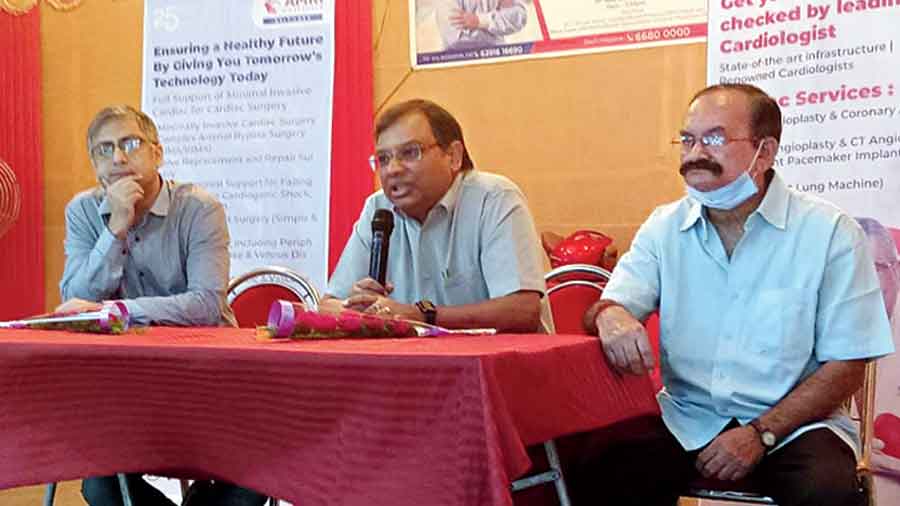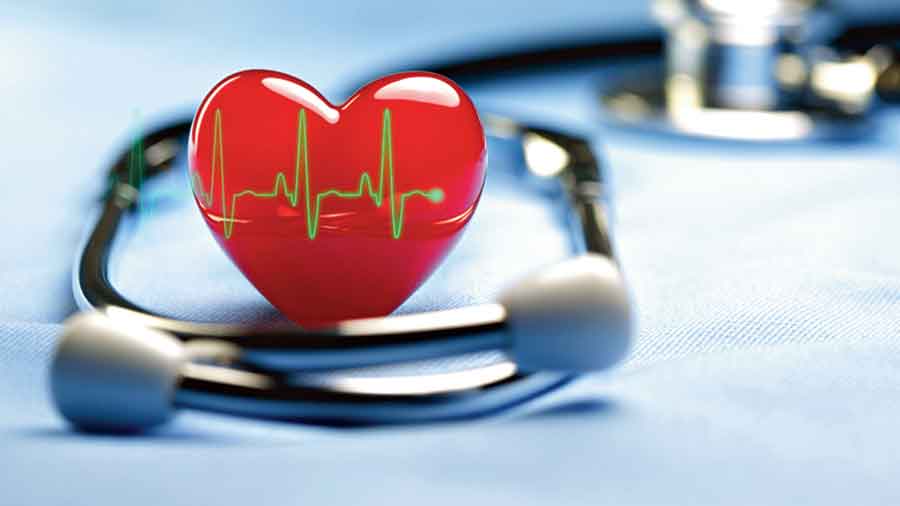The fourth wave of Covid may be on the downslide but an infection is leaving several persistent aftereffects, especially related to the heart. The BA Block residents’ association therefore organised a cardiac screening camp on July 31 at its community hall in association with AMRI Salt Lake.
Dr Binayak Chanda, cardiothoracic and vascular surgeon (CTVS), and Dr Subhasis Roy Chowdhury, senior cardiology consultant, addressed residents at an interactive session. Dr Chanchal Dey, chairman of the block’s healthcare committee, also was on stage with them. The Telegraph Salt Lake shares some of their insights.
What can I do to prevent a heart attack?
Nothing is absolute. While there are a few modifiable risk factors, there are a few non-modifiable risk factors too. The very fact that one is born a man makes one more susceptible to heart diseases. Stopping smoking is an important step that can be easily taken. Also alcohol consumption must be no more than moderate.
If I start drinking in small quantities today, will that reduce my chances of getting a heart attack?
The studies that talk about consumption of alcohol and its beneficial effects on the heart were all done in a very small control group in France, where they had used the best quality of wine. To extrapolate that and draw a conclusion for the Indian public who probably consume a much inferior quality of alcohol is not a good idea.
Does COVID actually cardiac effects?
Yes. There is no doubt that it does increase the incidence of heart attack. We had never seen such a large number of patients in the age group of 30-40 who are suffering heart attacks. The sad truth is we do not know what to do to stop this. All we can do is take precautions against contracting the disease. Take the vaccine when it is time and practice masking and proper hand hygiene.
There is no denying that Covid causes micro emboli formation. Definitely myocarditis (inflammation of the heart muscles) happens. All we can say is, don’t ignore it when you have chest pain. Seek medical attention as soon as possible.
What is the scenario of Covid cases right now?
Though the number of positive cases had soared recently, the number of severe cases has very significantly gone down. The number of patients who need admission has declined. Maybe we are slowly becoming immune to the virus, we do not know for sure!
Are all chest pains heart attacks?
Definitely not. While some pains can be very easily ruled out as non-cardiac, others fall in the grey zone where investigations become necessary. Without investigations, ruling out cardiac block often becomes difficult. In cases of very sharp pains, or the ones that radiate to the legs or the neck and then up to the head, we do not need tests. But if a patient comes saying there is tightness of chest and radiation of that pain to the left hand, there is definite cause for worry. However, that does not mean that all pains like that are symptoms of heart attack.

Dr Binayak Chanda addresses the audience as Dr Subhasish Roy Chowdhury (left) and Dr Chanchal Dey look on
What should I do if I have chest pain?
Go to the emergency room as soon as possible. Don’t waste time testing if the pain reduces on antacid consumption. There is a concept of golden time period within which medical procedures yield the best results. So, delaying and waiting around, consulting multiple relatives is not a good idea.
Can I differentiate heart attack from gastric pain?
It is not always easy to do so. Patients generally give us some previously ignored symptoms like tightness of chest and shortness of breath after walking some hundred metres which makes it easy for us to diagnose it as a cardiac pain. In other cases, we ask for an ECG.
Is ECG sufficient to diagnose a heart attack?
No. It is the first investigation that we go for in most cases — readily available and cheap. However there have been instances where angiogram has revealed blockage despite a normal ECG and abnormal ECGs have shown perfectly normal blood vessels on angiogram. ECG has a lot of fallacies, but it does have advantages as well.
What to do after an ECG?
That is for the clinician to decide. Heart attacks are not just about a piece of paper. The patient has to be clinically evaluated by a doctor. There are a lot of options available now, like stress tests, echocardiography, angiography...
Earlier, ECG and clinical examination were enough to diagnose heart attacks. Why are patients being subjected to so many tests nowadays?
Medical science has evolved. Life expectancy was 34 years earlier, which has now risen to 75. We follow a protocol in most hospitals nowadays, so that most number of cases get diagnosed correctly. Just relying on pulse palpation in today’s era is foolishness.
What is the most important step in reducing the risk of heart attacks that can be easily undertaken by an individual?
Stop eating junk food, roadside food that is cooked in reheated oil. Include 30 minutes of brisk walking in your schedule every day. That helps to reduce the risk of heart attacks by a huge margin.
Is it true that men are at increased risk of heart attack compared to women?
Yes. In the younger age group, it is almost impossible to find a woman who has suffered a heart attack. A menstruating woman is at a lower risk of heart attack than a man of the same age. However the risk in women increases drastically after menopause.
Can we expect robotic sugeries in the field of cardiology anytime soon?
It is more of a hype. Yes, we have a scarcity of doctors but not to the extent that one CTVS surgeon has to remotely operate on another patient sitting far away from the patient. Also, cardiac surgeries are very intricate. There are two main limitations of robotic surgery right now. One, the cost. Two, the availability of gadgets. Most have to be imported.
Is sudden loss of consciousness a symptom of heart disease?
It may be. Syncope, as we call it, can have two main causes — cardiac or cerebral. In this case, the defect is most commonly seen in the electro conductive mechanism of heart, causing heart blocks.
What is the difference between heart attack and heart block?
Heart attack is due to obstruction in blood supply to the muscles of the heart which is in turn responsible for pumping the blood to the entire body, whereas heart block is due to a defect in conduction of the electrical impulse that tells the heart muscles to contract.
